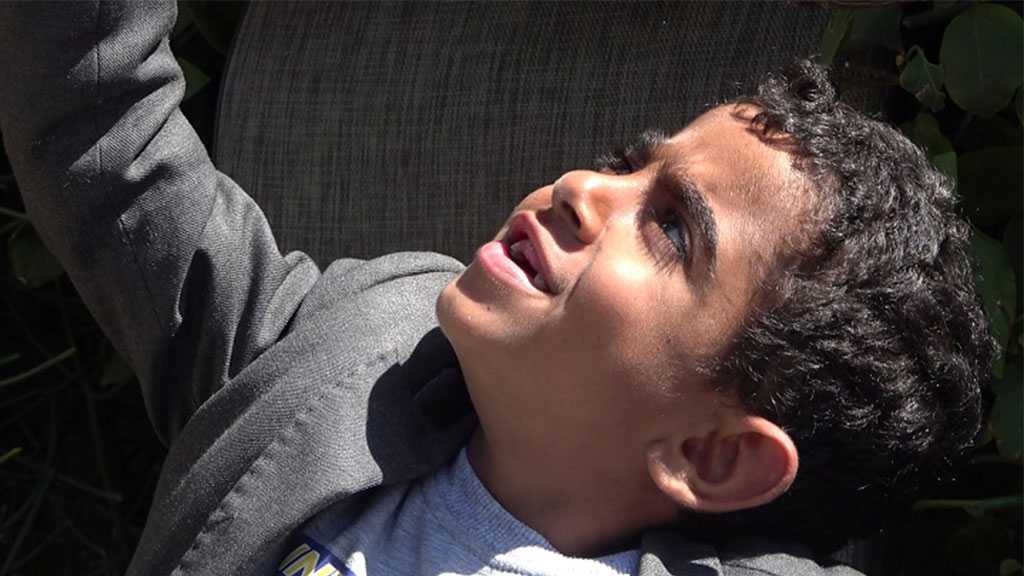
How US-Saudi Siege Prohibits Treatment of Yemeni Children with Renal Failure

By al-Masirah
In the capital, Sana'a, where hundreds of painful stories disappears with the hustle and bustle of life, the heroes are patients whose lives have brought them to live with pain and soreness.
Hospitals of the capital lack the minimum life-saving elements, which contain only a few antibiotics and some first aid because of the US-Saudi aggression and its blockade, which harms everything in life.
During five years of killing innocents and using prohibited weapons, the US-Saudi aggression has caused the largest humanitarian catastrophe on the face of the earth, according to humanitarian organizations, including the United Nations itself.
Yemenis are trying to stand up despite pain, but the continuation of the siege and aggression imposed on the country increases the deterioration of life and living conditions. It has worsens the lives of the sick and injured. Here in the capital, Sana'a, more than fifty patients suffering from chronic diseases appealed to the world months ago for their medical assistance abroad, and the World Health Organization promised them to travel after signing an agreement to start a Medical Air Bridge for the most difficult and irreversible humanitarian cases in Yemen.
But it was not permitted by the alliance of criminals in the US-Saudi aggression that abandoned all values and morals. They, the patients, went back to their homes, then they were called again and went back to their homes in their villages. Then that organization invited them to travel so they came carrying pain and hope to go out and travel out of the country for treatment, but they were surprised with the opposite because the countries of the aggression alliance led by Saudi Arabia and the UAE refused.
Here we met a number of those patients whose conditions worsen day after day and those who die of the disease. We met the child Khalil Hashid Sailan from the children of Amran governorate. The twelve-year-old is suffering from renal failure disease in his only left kidney, as his father confirms having the tests he conducted in 2014 [before the aggression].
Crying in pain and due to severe suffering, Khalil’s psychological and physical condition is worsening. He and his family had lost hope in survival after a health organization promised to take him out for treatment and the aggression coalition countries refused to open Sana'a Airport so that he travels alongside tens of thousands of patients who die daily due to the imposed siege on Yemen.
Talking to us, Khalil said: “We came to Sana'a in order to travel abroad after what the organization promised us. When we came to Sana'a, the organization said that the aggression refused to let us travel and open Sana'a Airport, and then they told us to stay in Sana'a to find a solution for us."
We asked him about his suffering with the disease. “I am sick and tired. I want to walk, go here and there, but I get tired, I wish I could go swimming,” he said, adding: “I swam in the pool and then I got sick, my heart ache, my stomach and my head, then my father paid three hundred thousand riyals in order to treat me, and I returned sick.”
Khalil Hashid tries to smile and laugh, wishes to enjoy the childhood life he lost due to his illness, dreams of returning to school to continue studying and playing with his peers after his pain and aches and more than eight surgeries he undergone in a number of hospitals. Khalil lost his mother from childhood. He lives with his father and grandmother, and it is the latter who prepared to give this child her kidney after they were matched to the same specifications required for his little body.
The child continues to speak to us with all spontaneity, saying: “yesterday the organization came and I told them that if you want you take us out for treatment or you can kill us, the cemetery is better than this life with pain.”
“Oh, get us out of here, we want to go for treatment, reopen Sana'a Airport, didn't you have humanity!” Khalil concluded with a painful innocent plea.
We tried to talk to his father, Hashed Saylan. He tried to curb his tears and hide his apparent sorrows on the face of everything he wished to see his son like the rest of the world.
The father said it is heartburning to see your son die in front of you and you can do nothing for him. We went and their calls were alarming for what is worse for the child in case the countries of the aggression alliance did not appeal to the call of humanity and the rights of a people whose children die due to the siege and aggression.
Khalil Hashid is one of dozens of patients from various Yemeni governorates, currently residing in the capital, Sana'a, after they were promised to travel abroad to receive treatment, but they clashed with disappointment from an alliance that gave up all moral and human values as well as Islamic and Arab ones. Meanwhile, a patient’s story races with death as every moment passes from his life while he remains untreated.
Comments



